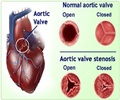Patients undergoing a minimally invasive procedure to replace the aortic valve without doing open heart surgery have better outcomes after five years than patients who did not have surgery at all.

Study author Samir Kapadia, director of the Sones Cardiac Catheterization Laboratories at Cleveland Clinic, said, "This trial is the first, and will probably be the only, randomized aortic stenosis trial that includes a group of patients not treated with aortic valve replacement, since these results will make it unethical to treat severe aortic stenosis patients with medical therapy alone."
The study was published in The Lancet, and presented at the American College of Cardiology (ACC) annual conference in San Diego, California.
Another study released at the ACC conference showed promise for a new device, called TriGuard, that helps surgeons prevent dangerous debris from reaching the brain during TAVR, resulting in better cognitive scores for patients who underwent the procedure. The new device covers the three arteries that lead to the brain with a temporary mesh shield. A small trial involving 83 patients showed 22.2% of patients with the device had heart or brain complications in the week after surgery, compared to 31.6% without the protective mesh. Fewer patients died after the procedure in the group using the mesh, 2.2% compared to 5.3% in the control group.
Source-Medindia












